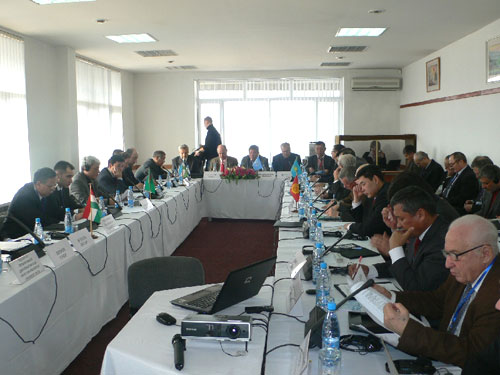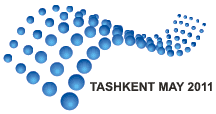REGIONAL MEETING ON DAMS SECURITY COOPERATION IN CENTRAL ASIA
The meeting on security of large hydraulic structures organized by the EC IFAS jointly with the UNECE and attended by representatives of all countries of the region and regional organizations and donors was held on 2-3 March, 2011 in Almaty.
The second phase activity of the project "Dam Safety in Central Asia: Capacity Building and Regional Cooperation" was summarized at the meeting. The project is aimed to two main components: strengthening national legal frameworks on safety of hydraulic structures and ensuring the regional cooperation.

As a result of work on the project from 2008 to 2011 the national awareness of the importance of this issue has progressed rapidly. If the initiator of this issue and the implemented policy on the issue was Uzbekistan, which organized a special institute for supervision of large structures and prepared the first law on dam safety in the region, then now a similar document is adopted in Tajikistan. All the other participating countries are working on the adoption of the appropriate law on the basis of the elaborated pattern. If Kazakhstan earlier postponed the adoption of this law, then the happened destruction of the small dam resulted in human toll prompted the government to reconsider its previous decision.
The main direction of works on dam safety should be preventive measures and the state control over the strict observance of all regulations, both in design and particularly during the operation. The guaranteed safety of dams and structures located at the transboundary water bodies and canals is of particular importance from the point of view of the possible negative impact on the security of neighboring countries. As noted by Mr. K. Ballyev, one of the leaders of the meeting, the issue of the structures security is closely intertwined with the strengthening of cooperation on rivers and grows into the issue on safety of the whole water management complex in the basin. Many donors and neighboring states are interested in this work, because such cooperation on security and risk management is unique even in the world practice.
The meeting outlined the platforms, as well as suggestions for further development of works. Attention was drawn to the need of the Hydrometeorological service involvement to this work and to transparency of the work program results presented by stakeholders. The meeting outlined the proposals on priority areas for further development of project activities at the national and regional levels, in light of the development of this theme within the ASBP-3.
Prof. V. Dukhovny,
Director SIC ICWC
INTERNATIONAL CONFERENCE
«TOWARDS THE 6th WORLD WATER FORUM – COOPERATIVE ACTIONS FOR WATER SECURITY»
May 12-13, 2011, Tashkent, Uzbekistan
That era of easy water is behind us. Definitively behind us. The era of unacceptable pillaging has given way to one of sharing. Progressively we will all consume better and waste less. This is our mission: to dedicate our time and our willpower to this sharing. Sharing between people of course, but also sharing between Man and Nature in order to pass on the resource our ancestors left us to future generations. This sharing must be sustainable so that sufficient, healthy water can be distributed whilst respecting biodiversity and protecting ecosystems. It must be equitable, because nobody has the right to deprive his neighbour of the water he naturally needs. The era of confiscated water is over. We are entering the era of shared water.
Loic Fauchon, President of the World Water Council

One of the major achievements of the World Water Council is its contribution to raising awareness about global water issues and political mobilization, which it achieved through the World Water Fora. As a step towards global collaboration on water issues, the Forum is a unique platform where the water community and policy- and decision- makers from all regions of the Globe can meet together to discuss and try to find solutions on water security.
The World Water Fora organized by the WWC every three years since 1997 in close cooperation with the host country’s authorities are the largest international events in the water sphere. They serve to achieve four main objectives:
- increasing importance of the political agenda;
- facilitating the deepening of discussions to address international water issues in the XXI century;
- formulating concrete proposals and calling people's attention on their importance
- constitute the political commitments.
For several years, the Forum facilitated the movement from the World Water Vision - a unique perspective doctrine about future situation with global water resources, of which outputs were presented at the 2nd WWF (2000) - up to identification of specific actions and commitments based on the solutions of the 3d WWF (2003).
Through the WWF4 (2006) towards the Millennium Development Goals regarding water, which have to be achieved in 2015, the World Water Council is searching for the cooperation and coordination mechanisms to transform a global vision into concrete actions to integrate local knowledges.
The WWF5 held in Istanbul in 2009 was focused on bridging at the global level various views and positions that still exist in some regions.
The World Water Council coordinated the main theme "From the goal to solutions" of the 6th World Water Forum aiming to achieve the Millennium Development Goals in a secure and sustainable supply of water for society, economy and nature, which will be held in 2012 in Marseilles (France).
Uzbekistan, being a member of the World Water Council since 2009 took the initiative to convene an international conference "Towards the 6th World Water Forum - cooperative actions for water security" in May 2011 within the preparatory process of the 6th World Water Forum.
The aim of the conference is to formulate and agree upon a regional agenda for countries of Central Asia and Caucasus towards the 6th World Water Forum in Marseilles.
The conference program corresponds to thematic scope of WWF6 main directions. The World Water Council has set 12 thematic key priorities, of which the following are most important for the region:
- Guarantee access to water services for all and the Right to Water
- Contribute to cooperation and peace
- Balance multiple uses through IWRM
- Ensure food security
- Improve the quality of water resources and ecosystems
- Respond to climate and global changes in an urbanizing world
For all of them the prerequisites for success should be good governance, financing for water and enabling environment.
The Conference will be in the form of 2 Plenary Sessions and 7 Round Tables, which all have to create the common outputs within regional priorities:
- Guaranteeing Water for Future Generations
- Risk Management and Water Security
- Adoption of innovations in agrarian sector in order to achieve food security
- International Cooperation on Transboundary Water Management on the Basis of International Water Conventions
- Integrated Water Resources Management – as a Tool for Balancing Multiple Uses of Water
- Climate Change and Conserving Environmental Capacity
- Drinking Water Supply and Sanitation Issues
The exhibition will be organized during the Conference.
The Conference organizing and conducting is supported by:
- Government of the Republic of Uzbekistan
- World Water Council
- Swiss Development and Cooperation Agency
- International Fund for Aral Sea saving
- Global Water Partnership of Central Asia and Caucasus
- Ecological Movement of Uzbekistan
The Conference is supported by sponsors:
- The Government of the Republic of Uzbekistan
- Swiss Agency for the Development and Cooperation
- The Government of the French Republic //
International Forum Committee
- Global Water Partnership Caucasus and Central Asia
- Embassy of the State of Israel in the Republic of Uzbekistan
More information: www.cawater-info.net/6wwf/conference_tashkent2011/
|